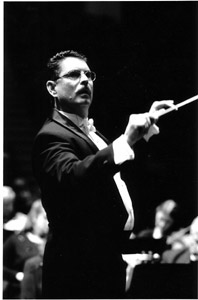![[Metroactive Arts]](/arts/gifs/art468.gif)
[ Arts Index | Santa Cruz Week | SantaCruz Home | Archives ]
 Bad Times For Good Works The Santa Cruz Symphony is at an artistic high point as it opens its new season--but can it beat the current classical music funk? By Scott MacClelland
AS LARRY GRANGER gives his Santa Cruz Symphony the downbeat this weekend, he and his orchestra find themselves lonelier than ever before. Indeed, if they are not standing at a crossroads, they are alarmingly close to one. Classical music as we have known it is under siege. Symphony orchestras everywhere are facing profound financial troubles. The rate of failure among classical presenters is accelerating, with some trying to survive by switching to "crossover" attractions. The classical recording industry has virtually collapsed. And we are hearing once again about classical radio stations throwing in the towel (the next likely victim is in Los Angeles). While it appears that this rapid deterioration in the support of classical music institutions will take more of them into the abyss, those with large endowments--major symphony orchestras and opera companies in large urban centers--should continue to flourish. And hypothetically that should concentrate support for the survivors. With what has become a retreat of classical music generally, Granger's recycling of such famous symphonic war horses as Tchaikovsky's Piano Concerto in B-flat Minor and Grofe's Grand Canyon Suite will probably reach ears which have not heard them for quite some time, and even some that have never heard them at all. Born in an era that saw the rise of bravura "thriller" piano concertos, Tchaikovsky's first (of three) is like no other. Too Daring for Its Time Its daring originality ran into a brick wall with the composer's mentor and friend Nikolay Rubinstein, an acclaimed pianist and composer himself of such thrillers (in his case long forgotten). When Tchaikovsky played the work through to get Rubinstein's input, he was first met with stony silence. In a letter written three years later, in 1877, he described the verbal outburst that followed: "It turned out that my concerto was worthless and unplayable; passages were so fragmented, so clumsy, so badly written that they were beyond rescue; the work itself was bad, vulgar; in places I had stolen from other composers; only two or three pages were worth preserving; the rest must be thrown away or completely rewritten." This all came at the point when Tchaikovsky began to suffer from the depression anxiety that would haunt him the rest of his life. In his rage over Rubinstein's remarks, Tchaikovsky vowed to publish the concerto without changing a note. Relations between the two men were sour for the next four years, even though Rubinstein did play the work often in public and even conducted it. Hans Boepple, soloist with the Santa Cruz Symphony, has himself played the concerto many times. His touch actually extends to this community through the many talented young pianists who have chosen him for their advanced studies. The American composer Ferdinand "Ferde" Grofe--inexplicably omitted from Stanley Sadie's first edition of the New Grove Dictionary of Music and Musicians--is best known for a piece he didn't write, but only scored: Gershwin's Rhapsody in Blue. A prolific composer of "light" music, he was a master orchestrator who turned his talent to American icons long before Michael Daugherty of Cabrillo Festival familiarity. the Grand Canyon Suite of 1931 is only the first of more than a dozen "pictures" that stretch to Virginia City: Requiem for a Ghost Town of 1968, composed 3 1/2 years before his death at age 80 in 1972. Granger already has a fantastic track record with this piece, having wowed an audience in Monterey with the Grand Canyon Suite when he conducted the youth orchestras of Monterey and Santa Cruz--numbering well over 100 young musicians--two seasons ago. This weekend's program opens with William Walton's Crown Imperial of 1937. The Santa Cruz Symphony must face the same risks as other classical producers and presenters. It is an invaluable community resource that happens to be at a high artistic point in its long history. It delivers the goods and deserves continued support.
The Santa Cruz County Symphony performs Saturday , Sept. 28, at 8pm at the Santa Cruz Civic Auditorium and Sunday, Sept. 29, at 2pm at the Mello Center in Watsonville. For tickets, call 462.0553. [ Santa Cruz Week | Metroactive Central | Archives ]
|
From the September 25-October 2, 2002 issue of Metro Santa Cruz.
Copyright © Metro Publishing Inc. Maintained by Boulevards New Media.